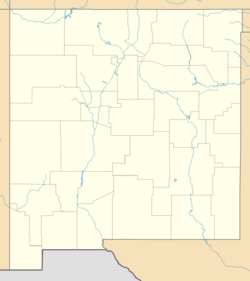Earth:Ringbone Formation
| Ringbone Formation Stratigraphic range: Campanian ~84–71 Ma | |
|---|---|
| Type | Geological formation |
| Underlies | Hidalgo Formation |
| Overlies | Mojado Formation |
| Thickness | 7,500 feet (2,300 m) |
| Lithology | |
| Primary | Mudstone |
| Other | Sandstone |
| Location | |
| Coordinates | [ ⚑ ] : 31°57′32″N 108°27′50″W / 31.959°N 108.464°W |
| Paleocoordinates | [ ⚑ ] 39°18′N 80°42′W / 39.3°N 80.7°W |
| Region | New Mexico |
| Country | United States |
| Type section | |
| Named for | Ringbone Ranch |
| Named by | S.G. Lasky |
| Year defined | 1938 |
The Ringbone Formation is a Campanian geologic formation in southwestern New Mexico.[1][2]
Description
The base of the formation is a conglomerate with boulders up to 2.5 feet (0.76 m) in diameter. The bulk of the formation is dark shale with minor sandstone and black limestone. The upper beds are tuffaceous sandstone with minor black limestone. A basalt flow and an andesite breccia are present in the upper beds.[1] The total thickness is about 7,500 feet (2,300 m). The formation interfingers with the underlying Mojado Formation and is overlain by the Hidalgo Formation.[3]
Fossils
The formation contains fossils of the gastropod Physa,[2][4] the palm Sabal, and other fossils consistent with Campanian age.[3]
Dinosaur remains of tyrannosaurs and hadrosaurs are among the fossils that have been recovered from the formation.[5] These include possible remains of Albertosaurus[6] and a hadrosaur tail skin impression.[7]
History of investigation
The formation was first named as the Ringbone Shale by Lasky in 1938 for outcrops near Ringbone Ranch in the Little Hatchet Mountains.[1] Zeller renamed the unit as the Ringbone Formation in 1970.[3]
See also
- List of dinosaur-bearing rock formations
- List of stratigraphic units with indeterminate dinosaur fossils
References
- ↑ 1.0 1.1 1.2 Lasky 1938.
- ↑ 2.0 2.1 Hayes 1970.
- ↑ 3.0 3.1 3.2 Zeller 1970.
- ↑ Basabilbazo 2000, p. 207.
- ↑ Weishampel, Dodson & Osmólska 2004, pp. 517–607, "Dinosaur distribution.".
- ↑ Lucas, Basabilvazo & Lawton 1990.
- ↑ Anderson et al. 1998.
Bibliography
- Anderson, Brian G.; Lucas, Spencer G.; Barrick, Reese E.; Heckert, Andrew B.; Basabilvazo, George T. (28 December 1998). "Dinosaur skin impressions and associated skeletal remains from the upper Campanian of southwestern New Mexico: new data on the integument morphology of hadrosaurs". Journal of Vertebrate Paleontology 18 (4): 739–745. doi:10.1080/02724634.1998.10011102. Bibcode: 1998JVPal..18..739A.
- Basabilbazo, George (2000). "The Upper Cretaceous Ringbone Formation, Little Hatchet Mountains, southwestern New Mexico". New Mexico Geological Society Field Conference Series 51: 203–210. https://nmgs.nmt.edu/publications/guidebooks/downloads/51/51_p0203_p0210.pdf. Retrieved 14 October 2021.
- Hayes, Philip Thayer (1970). "Cretaceous paleogeography of southeastern Arizona and adjacent areas". U.S. Geological Survey Professional Paper. Professional Paper 658-B. doi:10.3133/pp658B.
- Lasky, Samuel G. (1938). "Newly Discovered Section of Trinity Age in Southwestern New Mexico" (in en). AAPG Bulletin 22 (5): 524–540. doi:10.1306/3D932F80-16B1-11D7-8645000102C1865D. ISSN 0149-1423.
- Lucas, Spencer G.; Basabilvazo, George; Lawton, Timothy F. (December 1990). "Late cretaceous dinosaurs from the ringbone formation, southwestern New Mexico, U.S.A.". Cretaceous Research 11 (4): 343–349. doi:10.1016/S0195-6671(05)80045-X. Bibcode: 1990CrRes..11..343L.
- The Dinosauria (2nd ed.). Berkeley: University of California Press. 2004. ISBN 0-520-24209-2.
- Zeller, R.A. Jr. (1970). "Geology of the Little Hatchet Mountains, Hidalgo and Grant Counties, New Mexico". New Mexico Bureau of Mines and Mineral Resources Bulletin 96. https://geoinfo.nmt.edu/publications/monographs/bulletins/downloads/96/Bulletin96.pdf. Retrieved 16 September 2020.
 |


